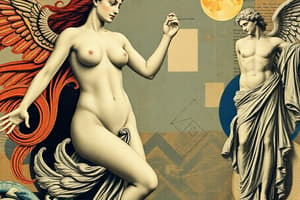Podcast
Questions and Answers
According to Natalie Haynes, what is a key aspect of Aphrodite's character often overlooked in traditional interpretations?
According to Natalie Haynes, what is a key aspect of Aphrodite's character often overlooked in traditional interpretations?
- Her capacity for strategic political influence and manipulation. (correct)
- Her role as a nurturing mother figure to mortals.
- Her dedication to maintaining peace and harmony among the gods.
- Her preference for solitude and avoidance of mortal affairs.
How does Natalie Haynes connect Aphrodite's disruptive power as a goddess of love and desire to a major event in Greek mythology?
How does Natalie Haynes connect Aphrodite's disruptive power as a goddess of love and desire to a major event in Greek mythology?
- By linking Aphrodite's influence on the Trojan War through the Judgement of Paris. (correct)
- By attributing the construction of the Parthenon to Aphrodite's inspiration of great architects.
- By illustrating how Aphrodite's love for Adonis led to significant agricultural advancements.
- By showing how Aphrodite's interventions prevented a major conflict between Athens and Sparta.
According to Natalie Haynes, how does examining Aphrodite provide insights into the perception and impact of female sexuality in ancient Greece?
According to Natalie Haynes, how does examining Aphrodite provide insights into the perception and impact of female sexuality in ancient Greece?
- It suggests that female sexuality was largely ignored or suppressed in ancient Greek society.
- It reveals that female sexuality was primarily viewed as subservient to male desires and expectations.
- It demonstrates that female sexuality was solely associated with fertility and procreation, lacking any broader social or cultural significance.
- It highlights how Aphrodite embodies the power of female sexuality and its potential to disrupt social norms and challenge male authority. (correct)
What broader context does Natalie Haynes suggest for Aphrodite's origins, moving beyond solely Greek narratives?
What broader context does Natalie Haynes suggest for Aphrodite's origins, moving beyond solely Greek narratives?
Which of the following best describes Natalie Haynes's approach to understanding Aphrodite?
Which of the following best describes Natalie Haynes's approach to understanding Aphrodite?
How does Aphrodite's role in the punishment of figures like Psyche and the women of Lemnos contribute to Natalie Haynes's interpretation of the goddess?
How does Aphrodite's role in the punishment of figures like Psyche and the women of Lemnos contribute to Natalie Haynes's interpretation of the goddess?
What is the significance of the story of Actaeon in the context of Natalie Haynes's analysis of Aphrodite, considering that Actaeon's story is typically associated with Artemis?
What is the significance of the story of Actaeon in the context of Natalie Haynes's analysis of Aphrodite, considering that Actaeon's story is typically associated with Artemis?
In the context of Aphrodite's origin, how does the account of her birth from sea foam, as opposed to being the daughter of Zeus and Dione, influence interpretations of her character and powers?
In the context of Aphrodite's origin, how does the account of her birth from sea foam, as opposed to being the daughter of Zeus and Dione, influence interpretations of her character and powers?
Flashcards
Who is Aphrodite?
Who is Aphrodite?
Greek goddess of love, beauty, pleasure, and procreation.
Aphrodite's Origins
Aphrodite's Origins
Zeus and Dione (Homer) or sea foam from Uranus's castration (Hesiod).
Cythera's significance
Cythera's significance
Often cited as Aphrodite's landing spot after her birth, before she arrived in Cyprus.
Cyprus and Aphrodite
Cyprus and Aphrodite
Signup and view all the flashcards
Haynes's Aphrodite
Haynes's Aphrodite
Signup and view all the flashcards
Aphrodite as a political goddess
Aphrodite as a political goddess
Signup and view all the flashcards
Aphrodite & Trojan War
Aphrodite & Trojan War
Signup and view all the flashcards
Female Sexuality
Female Sexuality
Signup and view all the flashcards
Study Notes
- Aphrodite is the ancient Greek goddess of love, beauty, pleasure, and procreation.
Origins and Birth
- There are two primary accounts of Aphrodite's birth.
- In Homer's Iliad, she is described as the daughter of Zeus and Dione.
- According to Hesiod's Theogony, Aphrodite was born from the sea foam produced when Cronus castrated Uranus and threw his genitals into the sea.
- This sea foam birth gave rise to her name, as "aphros" means foam in Greek.
- The island of Cythera is often cited as her place of landing after her birth, before she sailed to Cyprus.
- Cyprus is widely considered her sacred home, where she was worshipped.
Natalie Haynes's Interpretation of Aphrodite
- Natalie Haynes offers a nuanced interpretation of Aphrodite, challenging traditional views of her as merely a goddess of beauty and love.
- Haynes explores the complexities of Aphrodite's character, highlighting her power, agency, and the darker aspects of her influence.
- Haynes emphasizes Aphrodite's role as a political goddess.
- Haynes connects Aphrodite's disruptive power as a goddess of love and desire to the Trojan War.
- The Judgement of Paris, where Aphrodite wins the golden apple by promising Paris the most beautiful woman in the world (Helen), is a key event that triggers the war.
- This interpretation underscores how desire and beauty can have significant political and social consequences.
- Haynes delves into Aphrodite's associations with other goddesses from the Near East, suggesting a broader, more ancient origin for her cult.
- This perspective situates Aphrodite within a network of powerful female deities worshipped across different cultures.
- Haynes explores Aphrodite's capacity for vengeance and her willingness to use her powers to punish those who offend her or deny her worship.
- People like Psyche were punished for being too beautiful, Actaeon who saw Artemis naked (in some versions via Aphrodite's machinations), or the women of Lemnos who didn't worship her.
- This darker side of Aphrodite reveals her as a force to be reckoned with, rather than simply a passive figurehead of beauty.
- While Aphrodite is often associated with sexuality and desire, Haynes examines how these aspects of her domain were viewed in ancient Greece.
- Aphrodite embodies the power of female sexuality and its potential to disrupt social norms and challenge male authority.
- By examining myths, art, and historical sources, Haynes offers a comprehensive and insightful portrait of Aphrodite.
- Haynes encourages a more critical and nuanced understanding of this complex and multifaceted goddess.
Studying That Suits You
Use AI to generate personalized quizzes and flashcards to suit your learning preferences.




